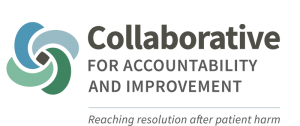Policy Resources to Support the Implementation and Spread of CRPs
Communication and Resolution Programs (CRPs), also known as Early Disclosure, Disclosure Apology and Offer or Communication and Optimal Resolution (CANDOR) programs, focus on responding to an adverse medical outcome through prompt and ongoing communications (transparency), correction of systemic errors (patient safety improvement), and recognition of all parties’ needs following the event (doing no further harm).
Several states have enacted legislation aimed at removing barriers to the implementation and spread of CRPs. The Policy Committee of the Collaborative for Accountability and Improvement has developed resources for legislators, policymakers, and others who want to better understand CRPs and the current legislative landscape, including a fact sheet and summaries of the four most comprehensive state laws.
As a program of the University of Washington, which is an agency of the state of Washington, the Collaborative for Accountability and Improvement is prohibited under most circumstances from attempting to influence or defeat any legislation. This prohibition includes engaging in “grassroots” or other indirect forms of lobbying.
Download the CRP Fact Sheet for State Legislators to share with these resources.
Colorado
The Colorado Candor Act, enacted in 2019, was intended to be a tool that formalizes the Candor process of responding to adverse events by encouraging open communication between health care providers and patients and their families while also offering legal protections to heath care providers who participate. The goal was to encourage full and honest discussions after an unexpected outcome, to learn from that outcome, and to prevent similar adverse events with future patients. The statute also provides a way to share de-identified information regarding an adverse health care incident to non-profit organizations for purposes of patient safety research and education without waiving the privilege.
Iowa
The Communication and Optimal Resolution Program, enacted in 2015 and amended in 2017, is bipartisan legislation intended to encourage transparency and accountability in the case of adverse medical events, provide additional support to patients, families, and health care providers, and strengthen patient safety and quality improvement processes. The focus of the legislation included the mental health benefits of candor versus litigation, maintaining doctor-patient relationships, reducing costs associated with resolution, personalization of resolution, and the ability to provide a forum for smaller value cases. The 2017 amendments broadened the participants in the healthcare system covered and clarified the events to which it applied.
Massachusetts
The Massachusetts 2012 Payment Reform Legislation liability provisions were negotiated and enacted to encourage the development of the “disclosure, apology and offer” model (“DA&O”) more recently known as communication and resolution programs (“CRP”) for resolution of claims following medical injury. Under this statute, statements of apology, regret, mistake, error, general sense of concern made by a health care provider are not admissible in a judicial or administrative proceeding (unless there are contradictory or inconsistent statements). Additionally, full disclosure is required in cases of unexpected medical complications caused by provider mistake.
Oregon
The Resolution of Adverse Health Care Incidents was enacted in 2013 when the Oregon created the state’s Early Discussion and Resolution (EDR) process. EDR conversations are protected by state law and create the opportunity for participants to talk candidly about the harm that occurred, working towards reconciliation outside of the legal system. It allows patient and families, in addition to healthcare providers and healthcare facilities, to initiate these important conversations helping to build greater trust in the healthcare system. The open communication about patient harm events helps to foster a culture where learning and improved patient safety can occur.
Getting Started with an Institutional CRP Policy or Commitment Statement
A diverse group of professionals collaborated with families who have lost loved ones to a medical error to develop a guide to assist organizations in creating a policy or statement of commitment to CRP. The intent is to create a framework that can be adapted for your organization. Your final document should be reviewed by other key stakeholders at your organization, including but not limited to, senior leadership team, claims, risk, communications, medical staff, general counsel, nursing, and mission/pastoral care. Your final document should be a document that you will share with families and patients as well as the community.
Download the CRP Policy or Commitment Statement Guide to get started.
More CRP policy tools and resources are available in our resource library.
